Producing biofuel from bioengineered marine algae
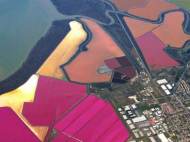 Biologists at UC San Diego have genetically engineered marine algae to produce five different kinds of industrially important enzymes in fresh water, and they claim that the same process could be used to enhance the yield of petroleum-like compounds from algae grown in salt water. This approach would allow biofuel production in the ocean or in the brackish water of tidelands or even on agricultural land on which crops can’t be grown due to high salt content in the soil.
Biologists at UC San Diego have genetically engineered marine algae to produce five different kinds of industrially important enzymes in fresh water, and they claim that the same process could be used to enhance the yield of petroleum-like compounds from algae grown in salt water. This approach would allow biofuel production in the ocean or in the brackish water of tidelands or even on agricultural land on which crops can’t be grown due to high salt content in the soil.
“What our research shows is that we can achieve in marine species exactly what we’ve already done in fresh water species”, said Stephen Mayfield, a professor of biology at UC San Diego and lead researcher of the research project. “There are about 10 million acres of land across the United States where crops can no longer be grown that could be used to produce algae for biofuels. Marine species of algae tend to tolerate a range of salt environments, but many fresh water species don’t do the reverse. They don’t tolerate any salt in the environment.”
While previous 40 years of research related to fresh water species of algae let to breakthroughs in their growth, gene manipulation and expression of recombinant proteins led to more viable biofuel production, there were only assumptions that similar approaches could be applied onto marine species.
The UC San Diego biologists focused their study on a marine species of alga (Dunaliella tertiolecta) since it has high oil content and ability to grow rapidly under a wide range of conditions with different salinity and acidity.
In order to demonstrate that marine algae could be used in commercial biofuel production, they introduced five genes into the Dunaliella tertiolecta that produced five different kinds of enzymes. Aside being used in a process where biomass in converted into fuel, some of these enzymes came from a fungus that degrades plant materials into simple sugars, thus making them potentially useful for increase of nutrient availability in animal feed.
“We hope to eventually determine whether whole algae, post-oil extraction, may be used as a feed additive to improve animal feeds. Animal feed is a relatively high volume market that may be able to benefit from algae-produced proteins as a feed additive”, said Mayfield, who also directs the San Diego Center for Algae Biotechnology (SD-CAB) – a consortium of research institutions in the region working to make algal biofuels a viable transportation fuel in the future.
Aside finding a way to genetically transform marine algae into a biofuel crop – a finding which expands the kinds of environments in which algae can be conceivably grown for biofuels – the research could inspire other research groups to explore other types of algae and modifications in order to increase the yield.
For more information, read the article published in the journal Algal Research: “Production of recombinant enzymes in the marine alga Dunaliella tertiolecta”.



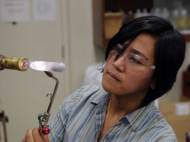
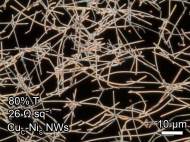
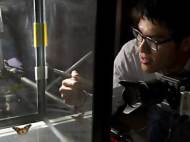
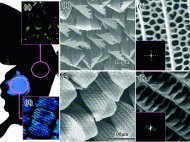


Leave your response!